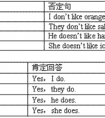—_____ the boys enjoy _____the puppet (木偶) show of Yangzhou?—Yes, they _____.[ ]A. Does; watching; doesB. Do; watch; doC. Do; watching; doD. Does;-七年级英语
一、动名词作主语
1. 直接位于句首做主语。例如:
Swimming is a good sport in summer.
2. 用 it 作形式主语,把动名词(真实主语)置于句尾作后置主语。
动名词做主语时,不太常用 it 作先行主语,多见于某些形容词及名词之后。例如:
It is no use telling him not to worry.
常见的能用于这种结构的形容词还有:better,wonderful,enjoyable,interesting,foolish,difficult,useless,senseless,worthwhile,等。
注意:important,essential,necessary 等形容词不能用于上述结构。
3. 用于“There be”结构中。例如:
There is no saying when he'll come.很难说他何时回来。
4. 用于布告形式的省略结构中。例如:
No smoking ( =No smoking is allowed (here) ). (禁止吸烟)
No parking. (禁止停车)
5. 动名词的复合结构作主语
当动名词有自己的逻辑主语时,常可以在前面加上一个名词或代词的所有格,构成动名词的复合结构
(这时,名词或代词的所有格做动名词的逻辑主语)。
动名词的复合结构也可以在句中作主语。例如:
Their coming to help was a great encouragement to us.
二、动名词作宾语
1.作动词的宾语
某些动词后出现非限定性动词时只能用动名词作宾语,不能用不定式。常见的此类动词有:
admit, appreciate, excuse, stand, advise, allow, permit, avoid, consider, enjoy, finish
They went on walking and never stopped talking.他们继续走,说个不停。
I found it pleasant walking along the seashore.在海滩上走真是乐事。
Mark often attempts to escape being fined whenever he breaks traffic regulations.
每当马克违反交通规则时,他常常企图逃避罚款的处分。
2.作介词的宾语
We are thinking of making a new plan for the next term. 我们正考虑为下学期制定新的计划。
Shall we have a rest or get down to doing our work? 我们休息呢还是开始干活?
3.作形容词的宾语
The music is well worth listening to more than once. 这种曲子很值得多听几遍。
We are busy preparing for the coming sports meet. 我们正为马上到来的运动会忙着做准备。
三、动名词作表语
动名词作表语时句子主语常是表示无生命的事物的名词或what引导的名词性从句。
表语、动名词与主语通常是对等的关系,表示主语的内容,主语、表语可互换位置。
Your task is cleaning the windows. 你的任务就是擦窗户。
(Cleaning the windows is your task.)
What I hate most is being laughed at. 我最痛恨的就是被别人嘲笑。
(Being laughed at is what I hate most.)
四、动名词作定语
动名词作定语往往表示被修饰词的某种用途。如:
a walking stick =a stick for walking=a stick which is used for walking
a washing machine=a machine for washing=a machine which is used for washing
a reading room=a room for reading=a room which is used for reading
a measuring tape=a tape for measuring=a tape which is used for measuring
sleeping pills=pills for sleeping=pills which is used for sleeping
动名词也有时态和语态的变化,如表所示(以及物动词write为例),不及物动词没有语态的变化。
| 时态、语态 | 主动 | 被动 |
| 一般式 | writing | being written |
| 完成式 having written |
having been written |
1) 动名词做主语时,谓语动词为单数
2) 在动名词和不定式中,作为介词的宾语是动名词
3) 动名词的否定直接在其前加否定词,通过代词的宾格或所有格形式给出逻辑主语
例:I would appreciate you calling back this afternoon.
4) 有些词后只能接动名词
acknowledge;admit; advise;advocate;allow;appreciate; avoid; celebrate; consider; contemplate; defer; delay; deny;
detest; discontinue; dislike; dispute; enjoy; it entails; escape; excuse; explain; fancy; feel like; finish; forgive; can’t help;
hinder; imagine; it involves; keep; it means; mention; mind; miss; it necessitates; pardon; postpone; practice; prevent;
recall; report; resent; resist; risk; suggest; understand...
5) 另外还有一些接-ing形式的常用说法
it’s no good; it’s no/little/hardly any/ use; it’s not/hardly/scarcely use; it’s worthwhile; spend money/time; there’s no;
there’s no point in; there’s nothing worse than; what’s the use/point
6) 有些词后面加不定式和动名词均可
remember,forget,try,stop,go on,continue,stop,regret,cease,mean后面均可用不定式和-ing形式,但意义截然不容。
例:remember to do/doing:
①I remembered to post the letters.(指未来/过去未来将要做的动作)
②I remembered posting/having posted the letters.(我记得做过这个动作)
forget与remember的用法类似。
regret的用法:
①I regret to inform you that…(我很遗憾地通知你……)
②I regretted having left the firm after twenty years.(为了“二十年前的离开”而遗憾。)
try to(努力)与try +–ing(试验):
①You really must try to overcome your shyness.
②Try practicing five hours a day.
考点名称:一般疑问句
- 一般疑问句:
是疑问句的一种。通常用yes,no来回答的疑问句叫做一般疑问句。口语中若无特殊含义,句末用升调。
其结构是:系动词be/助动词/情态动词+主语+其他成分?
通常回答为:
肯定:Yes+主语+提问的助动词
否定:No+主语+提问的助动词+not
例如:
Are you from Japan? Yes, I am./No, I'm not.
Do you live near your school? Yes, I do./No, I don't.
Can you speak French? Yes, I can./No, I can't. - 一般疑问句的特性:
1.将陈述句变为一般疑问句时,如句中有be 动词(am/ is/ are)时,可直接将它们提至主语前。
如主语为第一人称,应将其改为第二人称。如:
I'm in Class 2Grade 1. →Are you in Class 2Grade 1﹖
We're watching TV. →Are you watching TV﹖
2.陈述句中有情态动词(can、may、must …)时,也可直接将它们提至主语前,即可成为一般疑问句。如:
He can swim now. →Can he swim now﹖
The children may come with us. → May the children come with us﹖
3.陈述句中只有一个实义动词作谓语且其时态为一般现在时,变为一般疑问句时要在句首加do或does主语后的实义动词用原形。如:
I like these animals. →Do you like these animals﹖
She wants to go to the movies. → Does she want to go to the movies﹖
4.一般疑问句一般读升调(↑)
5.一般疑问句有时不用yes或 no 回答。如:
Are they in town now﹖
I think so.
May I sit here﹖
Certainly.
Does he like soccer﹖
Sorry I don't know.
6. 一般疑问句的第一单词总是虚词,读的时候要读轻声。 - 陈述句变为一般疑问句技巧:
根据一般疑问句不同的家族,可以用不同的方法将陈述句变为相应的一般疑问句。
1、第一家族:含be动词或情态动词的句子
秘诀:一调二改三问号
一调:即把句中的be或情态动词调到主语前;
二改:改换主语称谓,即将句中的主语I\my \mines\we\our\ours等。第一人称分别改为相应的第二人称you\your\ yours等;
三问号:句末的句号改为问号。如:
Eg. I am an English teacher. → Are you an English teacher?
Eg. We can speak English fluently. → Can you speak English fluently?
2、第二家族:含行为动词(或称为实义动词)的句子
秘诀:一加二改三问号
一加:即在句首加助动词Do或Does;
二改:1、把谓语动词改为原形;2、改换主语称谓(同第一家组);
三问号:句末的句号改为问号。
Eg. We read English every morning. → Do you read English every morning?
- 最新内容
- 相关内容
- 网友推荐
- 图文推荐
上一篇:词汇运用1. He often spends lots of time _____ with his friends online. (chat)2. Good _____with your trip to Hongkong. (luck)3. In my family everyone has ___-七年级英语
下一篇:Thank you for ______ the class trip. [ ]A. organizeB. to organize C. organizing D. to organizing-七年级英语
零零教育社区:论坛热帖子
| [家长教育] 孩子为什么会和父母感情疏离? (2019-07-14) |
| [教师分享] 给远方姐姐的一封信 (2018-11-07) |
| [教师分享] 伸缩门 (2018-11-07) |
| [教师分享] 回家乡 (2018-11-07) |
| [教师分享] 是风味也是人间 (2018-11-07) |
| [教师分享] 一句格言的启示 (2018-11-07) |
| [教师分享] 无规矩不成方圆 (2018-11-07) |
| [教师分享] 第十届全国教育名家论坛有感(二) (2018-11-07) |
| [教师分享] 贪玩的小狗 (2018-11-07) |
| [教师分享] 未命名文章 (2018-11-07) |

![Which of the following can you probably see in the meeting room? [ ]A. B. C.D. -七年级英语](http://www.00-edu.com/d/file/ks/4/2/dongmingci/2020-01-08/small97361980a56115e1c9237567439904fe1578422951.jpg)

![—Can the boy finish_____ the book in about a week? —I think he can. [ ]A. read B. reading C. to read D. reads -八年级英语](http://www.00-edu.com/d/file/ks/4/2/dongmingci/2020-01-08/smallfa4d713075e249356362fe7392193a301578421751.png)


